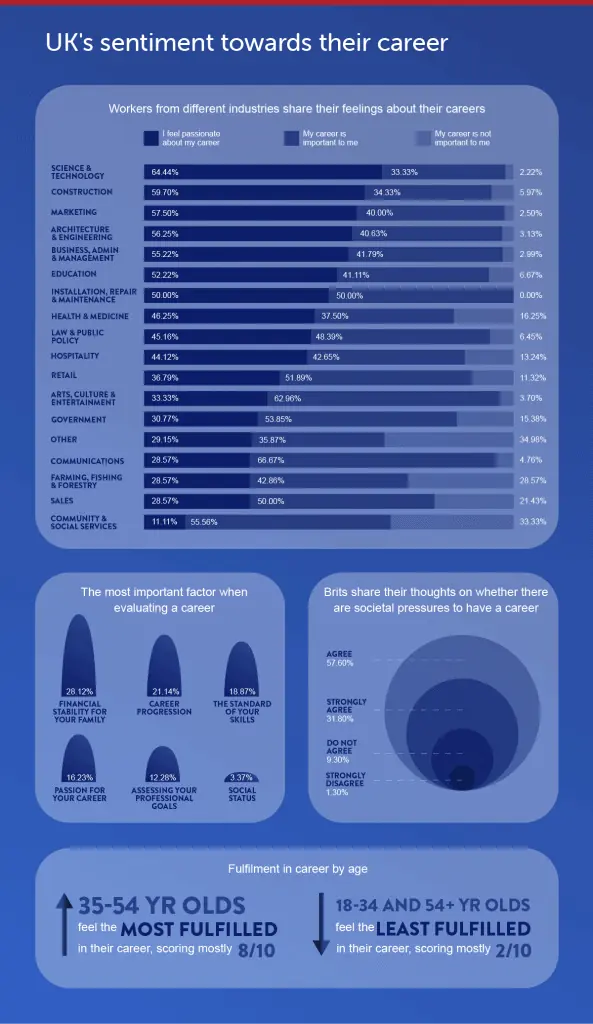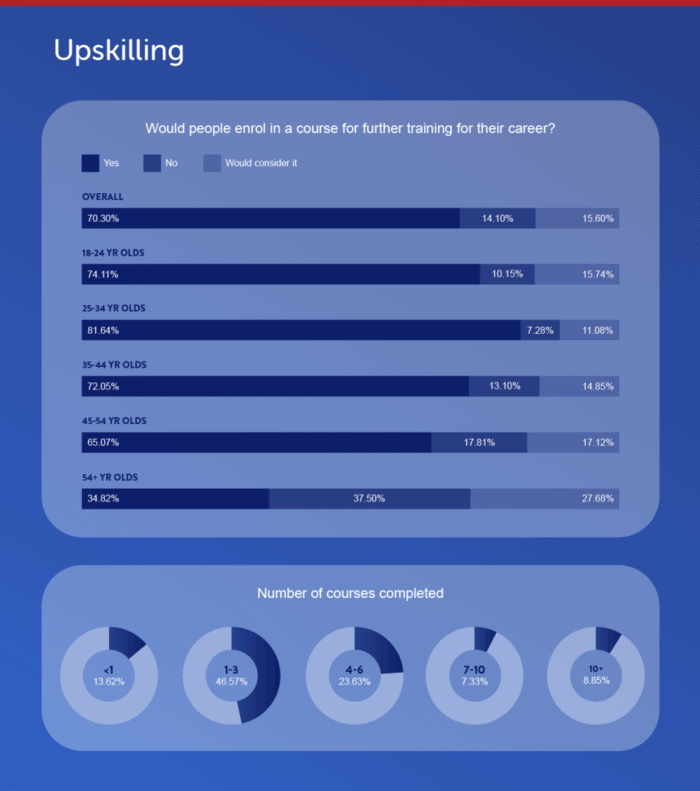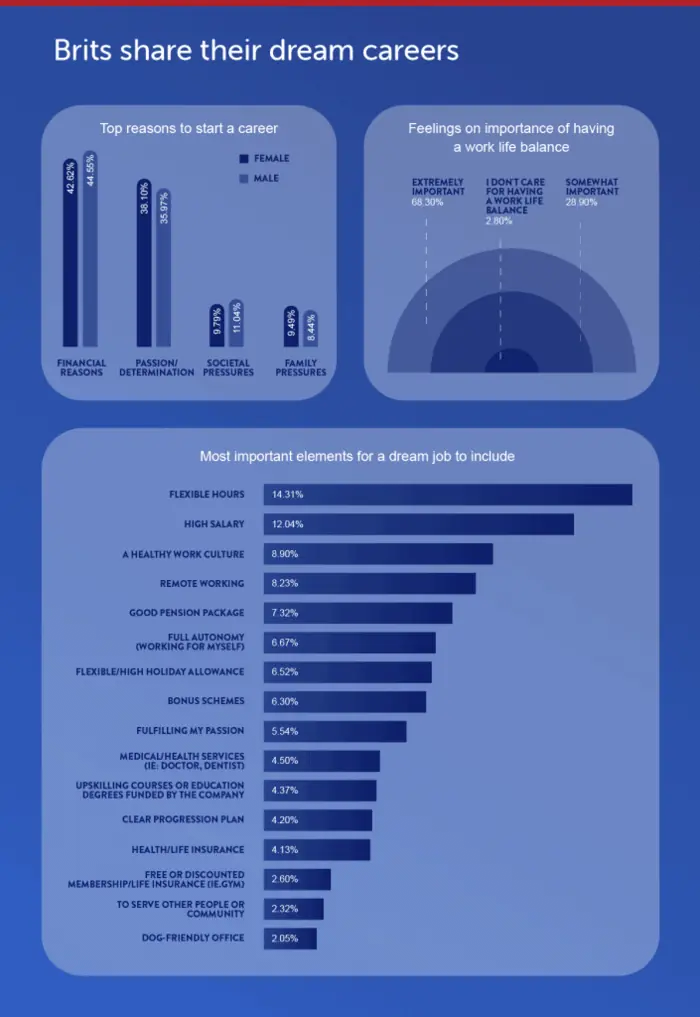Career Confessions: Brits share their dreams, regrets and ‘what ifs’
January 23rd, 2023
Career Advice
As we head into 2023, you may see the new year as the perfect opportunity to shake up your career. Whether you’re interested in enrolling in a course to learn something new in your field or you’re in the mood for a complete career change, there’s no better time to shift the direction of your working life.
As part of our Career Confessions campaign, we asked 1,000 men and women in the UK a series of questions to get a better understanding of their working lives and how they feel about them. From first jobs, changing career paths, upskilling and perfecting that work-life balance, to the dreams, regrets and ‘what ifs’ of what could have been, our survey explores it all.
For inspiration on how to change your career path for the better, check out our campaign in full.
Looking at the bigger picture
To gain an overview of how Brits feel about work, we started by asking our respondents how many careers they currently have. Our data shows that nearly three-quarters (73%) of respondents said they have one career. A further 16% said they have two occupations at present, while 7% of people currently juggle three roles – and if this wasn’t enough, 4% of Brits have four jobs and 1% somehow manage five.
We also asked our respondents to share the age they were when they started in their first career. The majority (63%) of people were aged between 18 and 24, while just over a quarter (26%) were slightly older, falling into the 25-to-34 age group. A small percentage (7%) revealed they started their careers between the ages of 35 and 44, suggesting it’s never too late to pursue the job you want.
According to our survey data, it’s relatively common for people to have had more than one career. Although more than a third (36%) said they’ve followed just one career path, 30% of people said they have had two careers, with 18% having had three.
But what are some of the reasons behind these multiple career changes? Over a quarter (28%) of people said they wanted a fresh start, while 24% said career progression prompted them to swap professions. Some respondents (24%) were driven by money, admitting that a higher salary is what made them make the switch, while 13% sought out a different career for better working hours and 10% explored new avenues due to not feeling satisfied.

Career sentiment
So how do Brits really feel about their careers – and does it vary between industries? Our data shows those who work in the science and technology sector are the most enthusiastic about their roles, with 64% saying they feel passionate about having a career. At the other end of the spectrum, those within the farming, fishing and forestry industry seem to be the least interested in their work, with this sector scoring the highest percentage (29%) of people who feel that having a career is not important to them.
We also asked our respondents what is the most important factor when it comes to evaluating their careers. Many people (28%) answered that having financial stability for their family is the most important, with career progression being the second most popular answer (21%). Meanwhile, social status came in as the least important factor, with just 3% choosing this answer.

Career regrets
It’s not unusual to make mistakes throughout your working life, and you may find that you make choices you later regret which can then impact the trajectory of your career. But what type of work-related regrets do Brits have?
We asked our respondents to select which regrets they’ve had along the way. From the answers available, ‘working too much’ was the most selected answer, with 21% of people admitting they feel like they put in too many hours.
Meanwhile, not asking for a pay rise or promotion and staying in a job too long were also common regrets among our respondents, with 17% of people choosing each of these answers respectively. A further 15% of people regretted working in the wrong industry, while 12% of people wished they had spoken up about problems at the workplace.
When you’ve made a choice that you later regret, it can be easy to imagine ‘what if’ and question what may have happened if you’d done things differently. We asked our respondents to choose which ‘what if’ moments they’d had during their careers. Over a third (35%) of people said they’d wondered what if they’d taken a new job opportunity, while a further 32% selected ‘what if I had said no a little more?’ as their answer.

Upskilling
As an employee, upskilling can help you thrive in your job role, expanding your skill set and bringing added value to the company you work for. At the International Career Institute, we offer a range of distance learning courses that can help launch, change or advance your career. But just how many Brits would enrol?
Our survey shows that 70% of people would enrol in a training course, while 16% would consider it and just 14% of respondents said they would not enrol at all.
When breaking this down by age, the data shows that those within the 25-to-34 age group are the most keen to upskill with training, with 82% of people in this age bracket saying that they would enrol in a course. Meanwhile, those aged 54 and above are the least interested in honing their skills, with 38% of people in this age group admitting they wouldn’t want to enrol in a course for further training compared to 35% who said they would.

Moving up the career ladder
So what spurs Brits on to climb the career ladder? We asked our respondents their reasons for starting a career, with nearly half (42%) of people citing finances. Meanwhile, 39% said their passion and determination is what drives them to succeed in their field.
Interestingly, only 10% of people said societal pressures encourage them, and just 9% cited pressures from family, showing that perhaps people are not letting others influence them in their work choices.
Dream career
We all have an idea of what our dream career would look like. Our survey asked respondents what the most important elements of their dream job would be. Flexible hours was the most popular answer, with 14% of people selecting it. A high salary falls close behind at 12%. Other popular answers included a healthy work culture (9%), remote working (8%) and a good pension package (7%).
Part of having your dream career may be finding your ideal work-life balance. We asked our respondents how important it is for them to get this just right. Unsurprisingly, the majority (68%) of people said this is extremely important, and 29% said it’s somewhat important to them. Just 3% of people stated that they don’t care about having a work-life balance.
How do you feel about your career? Do you love what you do, or are you eager to upskill or make a career change this year? Share your own dreams, regrets and ‘what if’ moments using #CareerConfessions.

Online, career focused education that suits your lifestyle.
See our coursesGladys Mae serves as the General Manager and Head of Student Services at the International Career Institute. Gladys holds a degree in Mass Communication - Broadcast Media from the University of San Jose-Recoletos. She joined ICI in 2010 and has over the past 12 years been instrumental in providing leadership and guidance to staff and students alike. Prior to joining ICI Gladys led a multifaceted career with key roles in the banking and business process outsourcing industries.













